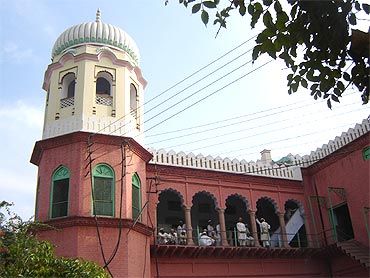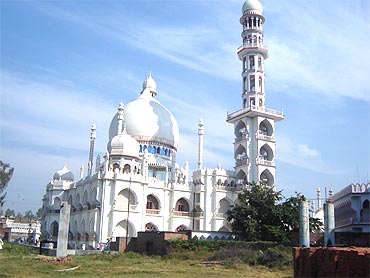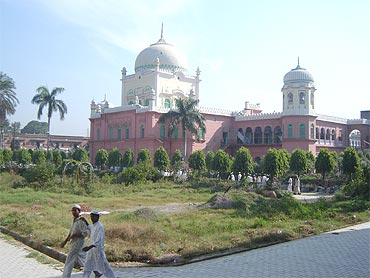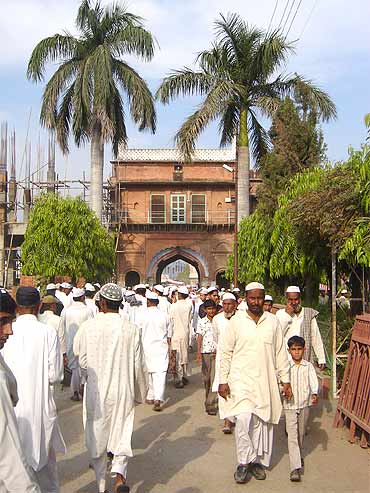No sooner had Ghulam Mohammad Vastanvi been appointed as the new head of the Dar ul-Uloom, Deoband, India's most influential madrasa and nerve-centre of the global Deobandi movement, than he found himself in the thick of controversy, which only seems to be getting more embarrassing and convoluted with every passing day.
Shortly after being appointed to his post, Vastanvi created a storm by claiming, in an interview given to a leading newspaper, that Muslims in Gujarat (from where he hails) were not subject to any form of discrimination, and that they were reaping the fruits, in the same way as other communities, of the state's chief Minister Narendra Modi's much-touted 'development model'.
Vastanvi's naive and wholly untenable statement won him fierce condemnation from Muslims (and some others) from across the country, who pointed out the continuing discrimination against Muslims in Gujarat and the fact that he had conveniently remained silent on Modi's central role in planning and instigating the horrific anti-Muslim genocide in 2002.
The leading Indian Muslim website twocircles.net carried a story based on an interview with Vastanvi, where he struggled to defend his controversial claim. The responses of a number of Muslims to the story, also hosted on the website, clearly indicated that many Muslims were horrified by his statement, which some of them took to be an unconcealed defence of Modi.
'It is an unfortunate day for Indian Muslims to have a person on the most respectable seat beginning his career of leading the Muslims in India with his praise of their most detested person,' bemoaned an anonymous writer. If Vastanvi could not have 'taken head on the enemies of Muslims,' he went on, 'at least he could have just shut up.'
'The right place' for Vastanvi, wrote a certain S M Pasha, 'is a lunatic asylum, and not the Dar ul-Uloom'. He called upon the authorities and well-wishers of the madrasa 'to show him the door.'
...
Mullahs too face scorn from readers
Image: The main building of the Deoband madrasaAnother writer, who preferred to remain unnamed, commented that Vastanvi's statement was hardly surprising as he, though a Gujarati, had suffered no economic loss in the pogrom and nor had any woman in his family been raped, in contrast to the many thousands of other Gujarati Muslims who were subjected to such unspeakable horrors in the course of the violence in which Modi had presided over.
A certain Shokat Jamati quipped that Vastanvi's 'misconceived statement' had 'brought disrepute' to the office of the rector of the Deoband madrasa, besides greatly angering many Muslims.
Likewise, another writer, Firoz Vohra, pointed out that justice continued to be denied to vast numbers of Gujarati Muslims who had suffered in the violence, and that fake encounters unfairly targeting them continued unabated. He insisted that Vastanvi apologise forthwith to the victims of the Gujarat massacre, adding that if he was not expelled from his new post at the Deoband madrasa, the very future of the institution would be in jeopardy.
Some writers argued that the problem was not Vastanvi himself, and that he was hardly alone among the mullah community for expressing absurd views. Abdul Kader Bootwala argued that 'most of the office-bearers' of the Deoband madrasa were in any case 'controversial' because of what he called 'their deeds or [their] issuing unnecessary fatwas and creating unrest among Muslims.'
Echoing the same view, a certain Shujat quipped that statements such as Vastanvi's were not at all surprising given the fact that the leading mass organisation of the Deobandi mullahs, the Jamiat ul-Ulema-e Hind, 'acts as proxy to the Congress'. He linked Vastanvi's statement to a larger context of what he suggested were the mullahs' 'long history of compromising Islamic aqaid (beliefs) for the sake of booty and power and posts.'...
Focus on improving the madrasa, say readers
Image: The facade of the madrasa at DeobandAt the same time, however, Khan appreciated somewhat the spirit of Vastanvi's statement in that, in his view, it indicated to Muslims how important it was for them to 'demonstrate to the world our intent of peace'. Vastanvi's offer of reconciliation in Gujarat, he seemed to suggest, was not novel in Muslim history. He claimed that in the past, too, Muslims had forgiven their enemies for grave atrocities, and that it was this that had inspired the latter to shed their prejudices against Muslims and their faith so much so that, in some cases, they had even converted to Islam.
Khan pointed out that the Prophet Mohammed had behaved in a similar fashion with his oppressors, and, in this way, had shown Muslims 'what Islamic nobility really is.' Hence, he expressed his hope that in his capacity as head of the Deoband madrasa, Vastanvi would 'guide Muslims' in such a way that they would be able to forgive their tormenters. But alongside this, he expected Vastanvi to help the families of the victims of the Gujarat anti-Muslim pogroms and also shoulder the much-needed task of promoting 'introspection' among his fellow Deobandis so that the Deoband madrasa ceased forthwith what he called its 'flimsy fatwas' and its sectarian and 'Urdu-wala mentality'.
Yet other readers, while not necessarily agreeing with Vastanvi's statement, were less harsh on the man. A certain Tariq advised Vastanvi to avoid making such statements henceforth for fear that the media, which he termed as 'much saffronised' [pro-Hindutva or anti-Muslim] could easily misconstrue them. Instead, he suggested, if Vastanvi needed to convey a message through the press, he should simply issue a press release.Shakil Khan, who identified himself as a professor from Punjab, suggested that rather than getting himself embroiled in controversy, Vastanvi ought to focus on improving the Deoband madrasa. 'Maulana Saheb,please keep away from politics," he wrote.
...
Vastanvi's words have found support as well
Sarfaraz wrote in to claim that Vastanvi had been misunderstood and that his statement was not wrong. Ghulam Mohiyuddin commented that while the anti-Muslim violence of 2002 could not be forgotten, Muslims, as Vastanvi had suggested, 'must emphasise the positive' and 'participate as best as [they] can in Gujarat's impressive development, while continuing to pursue justice...Now, it is time we move on.'
Likewise, V M Khaleelur Rahman claimed that Vastanvi's statement indicated that he was one person who was capable of practically assisting the Muslims of Gujarat because, so he said, he was 'different from' the stereotypical mullahs 'who continue to repeat things like a parrot and do not want to move on.' Vastanvi's statement, he commented, 'shows his interest in the welfare of the community and country.' He expressed the hope that under his leadership, the Deoband madrasa would, as he put it, 'be able to do things which are so necessary for the students nowadays. We can expect a better future for the Islamic students there.' He lauded what he regarded as Vastanvi's commitment to improving inter-community relations in Gujarat, which is what he seems to have taken his statement to suggest, adding, 'We can and should win the hearts of the people by and the administrators by our proper approach, and, certainly, a struggle is not a solution.' He even thanked Vastanvi for what he called his 'free, frank and fearless speech', and expressed the hope that his approach to communal rapprochement would take the Indian Muslims 'forward' and also help make India 'a beautiful place to live in.'
Vastanvi's future as head of the Deoband madrasa is now unclear. Far from dying out, the furore stoked by his statement is now being further fuelled by other accusations, leveled mainly from within the Deobandi community -- from a section of influential mullahs who regard him as a threat or a sell-out.
Deoband has never been free from such inner wrangling, of course, but this time the dissensions in, as the Deobandis call it, the 'fortress of the faith' are being hotly debated among 'ordinary' Muslims, too, unlike in the past, when they had remained largely limited to the mullahs themselves.





article